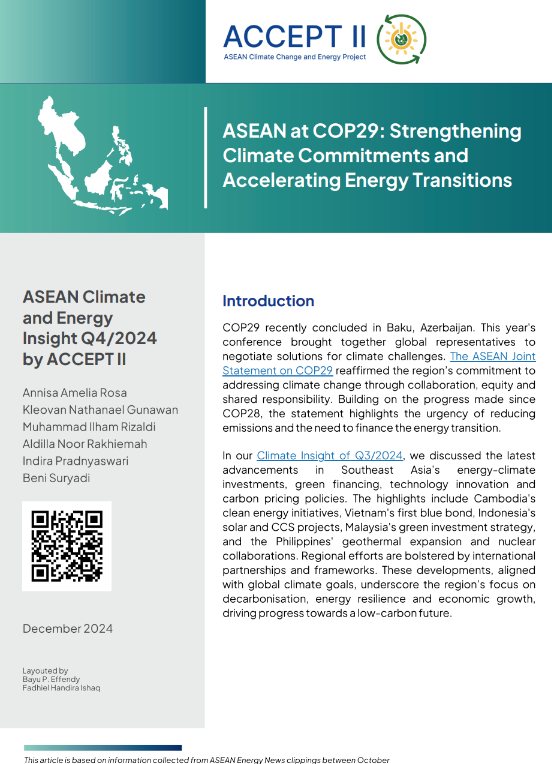
Category
Tag
Author
Annisa Amelia Rosa, Kleovan Nathanael Gunawan, Muhammad Ilham Rizaldi, Aldilla Noor Rakhiemah, Muhammad Rizki Kresnawan, Indira Pradnyaswari, Beni Suryadi
ASEAN reaffirmed its dedication to sustainable energy and climate action through the ASEAN Joint Statement on Climate Change at COP29. The statement emphasised regional collaboration, shared responsibility, and the urgency of addressing emissions while advocating for climate finance and equitable support for vulnerable nations.
At COP29, key pledges were announced: the NCGQ set climate finance at USD 300 billion annually by 2035. Article 6 was fully operationalized, enabling global carbon markets. The Energy Storage and Grids Pledge targeted 1,500 GW of storage and grid expansion by 2030, endorsed by Singapore and Malaysia. The Hydrogen Declaration to accelerate renewable hydrogen adoption was backed by Indonesia, Malaysia, and Singapore. Other related announcements and development were discussed during the conference and are further elaborated in this insight.
ASEAN countries reaffirmed their climate commitments: Malaysia, Indonesia, Thailand, Singapore and ASEAN Alliance agreed on advancing the ASEAN Common Carbon Framework (ACCF), a regional initiative to strengthen carbon market integration, promote cross-border trading, and set high standards for carbon trading mechanisms. Alongside this regional progress, ASEAN Member States (AMS) updated their national commitments, focusing on scaling up renewable energy, enhancing carbon trading mechanisms, securing climate finance, and promoting green investments. Countries such as Indonesia, Malaysia, the Philippines, Vietnam, and Singapore demonstrated concrete steps to accelerate energy transitions and strengthen climate resilience.